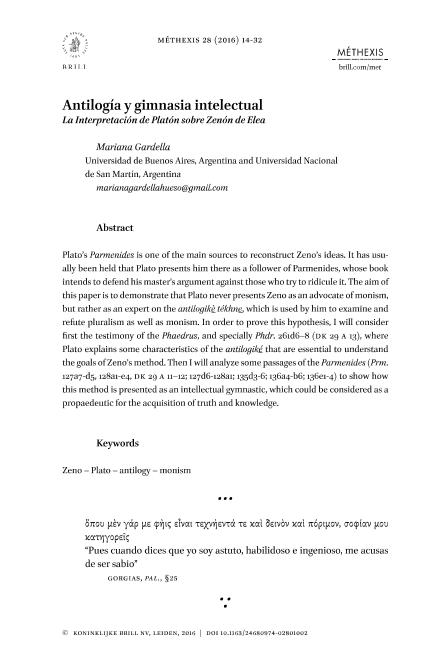Artículo
Antilogía y gimnasia intelectual: La interpretación de Platón sobre Zenón de Elea
Título:
Antilogy and intellectual gymnastics: The interpretation of Plato on Zeno of Elea
Fecha de publicación:
03/2016
Editorial:
Brill Academic Publishers
Revista:
Methexis
ISSN:
0327-0289
Idioma:
Español
Tipo de recurso:
Artículo publicado
Clasificación temática:
Resumen
Plato's Parmenides is one of the main sources to reconstruct Zeno's ideas. It has usually been held that Plato presents him there as a follower of Parmenides, whose book intends to defend his master's argument against those who try to ridicule it. The aim of this paper is to demonstrate that Plato never presents Zeno as an advocate of monism, but rather as an expert on the antilogikè tékhne, which is used by him to examine and refute pluralism as well as monism. In order to prove this hypothesis, I will consider first the testimony of the Phaedrus, and specially Phdr. 261d6-8 (dk 29 a 13), where Plato explains some characteristics of the antilogiké that are essential to understand the goals of Zeno's method. Then I will analyze some passages of the Parmenides (Prm. 127a7-d5, 128a1-e4, dk 29 a 11-12; 127d6-128a1; 135d3-6; 136a4-b6; 136e1-4) to show how this method is presented as an intellectual gymnastic, which could be considered as a propaedeutic for the acquisition of truth and knowledge.
Palabras clave:
ZENO
,
PLATO
,
ANTILOGY
,
MONISM
Archivos asociados
Licencia
Identificadores
Colecciones
Articulos(SEDE CENTRAL)
Articulos de SEDE CENTRAL
Articulos de SEDE CENTRAL
Citación
Gardella, Mariana; Antilogía y gimnasia intelectual: La interpretación de Platón sobre Zenón de Elea; Brill Academic Publishers; Methexis; 28; 1; 3-2016; 14-32
Compartir
Altmétricas




